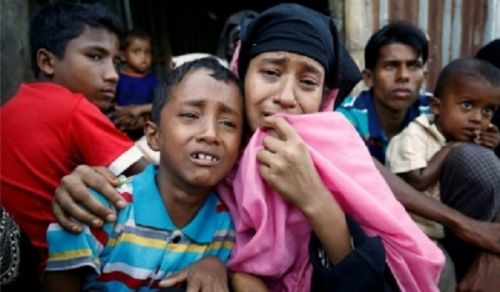
بسم الله الرحمن الرحيم
News & Comment
Aung San Suu Kyi Denies the Ethnic Cleansing of Rohingya Muslims in Myanmar: A Lesson in the Fickle Nature of Democracy’s Moral Compass
News
In an interview to the BBC on the 6th of April, head of Myanmar’s government, Aung San Suu Kyi, once hailed by western governments as an icon for the fight for democracy and human rights, denied that there was ethnic cleansing of the Rohingya Muslims in the country despite widespread evidence to the contrary. She also claimed absurdly that violence in the Rakhine state, home to the Rohingya Muslims, was partly down to Muslim killing Muslim rather than ethnic cleansing. This hailed golden girl of democracy, and leader of the country’s National League for Democracy, has refused to speak in defense of the rights of this persecuted minority, and also failed to condemn the brutal military crackdown on the Rohingya in October last year in which hundreds were killed and 75,000 forced to flee for their lives to Bangladesh. Additionally, international journalists have been refused access to the Rakhine state to report on the violence and horrendous conditions facing the Rohingya Muslims. Fergal Keane, the BBC journalist who interviewed Suu Kyi commented, “There is a profound paradox here. I and other journalists in Asia remember the days when it was the military regime that denounced our reporting of human rights abuses and accused us of exaggeration. Now these complaints are levelled by a democratically elected government led by a former political prisoner.”
Comment
Suu Kyi’s stubborn politically motivated denial of ethnic cleansing and attempts to block the discovery of the true horror facing the Rohingya Muslims cannot hide the facts on the ground. In February this year, the UN issued a report based on interviews with over 220 Rohingya in Bangladesh who fled the violence in Rakhine state last October. It accused Burmese security forces of having committing mass killings, gang rapes and burning down of villages in a campaign that “very likely” amounted to crimes against humanity and ethnic cleansing. The report included horrendous accounts of abuse, torture and summary executions, including of babies. In one case, it was reported that Burmese soldiers killed an 8-month old baby while his mother was gang-raped by 5 security officers. It also gave accounts of entire families being locked in their houses which were then set alight. According to Human Rights Watch, 1200 homes were razed in villages inhabited by Rohingya Muslims in just 6 weeks during the so-called ‘counter-insurgency operations’ last year. Many media also reported accounts of Myanmar forces shooting civilians even as they fled their villages, including using helicopter gunships in their ‘cleansing operation’ as well as deliberately destroying food and sources of food. In March this year, the United Nations special rapporteur on human rights in Myanmar, Yanghee Lee, told the UN Rights Council that the evidence, “indicates the government may be trying to expel the Rohingya population from the country altogether.”
Lee wanted to establish a UN Commission of Inquiry to investigate the bloody military crackdown but the European Union did not back her call due to concern that a damning UN investigation might threaten the country’s fragile democracy drive. This is despite the fact that in 2015, a study by the International State Crime Initiative at Queen Mary’s University in London stated that, “The Rohingya face the final stages of genocide,” and that they were on the verge of “mass annihilation”.
All this is a lesson, that with democracy, political opportunism and personal ambition will always override the moral high ground. The system corrupts even those who enter with good intentions such that they set aside their moral principles and long held beliefs for the sake of short-term political goals. The question should surely be asked – what is the credibility of any system and the virtue of its principles when blatant genocide against a people is denied for the sake of political interests? Furthermore, it is clear that the line between dictatorship and democracy is one that can so readily be blurred – with the whims of the majority oppressing minorities, facilitated by those in power. It is evidence enough that this democratic system can never be trusted to uphold justice or protect the rights of minorities, or indeed any of its citizens!
(أَفَمَنْ أَسَّسَ بُنْيَانَهُ عَلَى تَقْوَى مِنَ اللّهِ وَرِضْوَانٍ خَيْرٌ أَم مَّنْ أَسَّسَ بُنْيَانَهُ عَلَىَ شَفَا جُرُفٍ هَارٍ فَانْهَارَ بِهِ فِي نَارِ جَهَنَّمَ وَاللّهُ لاَ يَهْدِي الْقَوْمَ الظَّالِمِينَ)
“Is it then he, who laid the foundation of his building on piety to Allah and His Good Pleasure, better, or he who laid the foundation of his building on an undetermined brink of a precipice ready to crumble down, so that it crumbled to pieces with him into the Fire of Hell. And Allah guides not the people who are the wrongdoers.” [At-Tauba: 109]
Written for the Central Media Office of Hizb ut Tahrir by
Dr. Nazreen Nawaz
Director of the Women’s Section in the Central Media Office of Hizb ut Tahrir




